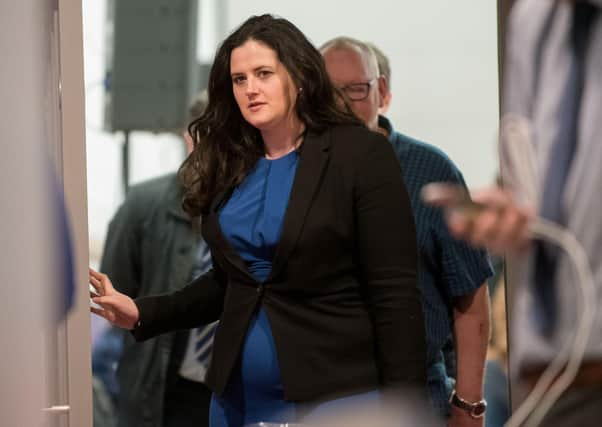In hard numbers: Ex-justice minister says ‘we must consider violence against men’


Sarah Everard’s disappearance and murder (for which a man is currently subject to legal proceedings) has sparked a wave of demonstration in spite of the ongoing pandemic lockdown.
Claire Sugden, independent unionist for East Londonderry who held the justice brief for a from May 2016 to March 2017, was one of a string of politicians speaking on the topic at Stormont yesterday.
Advertisement
Hide AdAdvertisement
Hide AdThe issue of the Everard murder was the opening topic of the day, led by Rachel Woods of the Green Party.
She said: “How many of us have been told not to walk home alone at night? I certainly have. My grandmother used to offer to pick me up from finishing my shift in the bar at 2am to leave me literally up the road, and my mother used to do the same when I started in the bakery at 6am.
“How many of us have been groped, touched, told that we were asking for it, assaulted or verbally abused?”
She added: “Societal problems like domestic abuse and sexual violence are gendered issues, and, if we fail to recognise this in our government, we fail to effectively tackle such issues. We cannot bury our heads in the sand any more. We need evidence-based strategies to deal with these issues head-on.”
Advertisement
Hide AdAdvertisement
Hide AdSimilar sentiments were voiced by speakers from across the political divide.
Alliance MLA John Blair said that, contrary to the assertion of Cressida Dick, head of the Metropolitan Police, “it is not an incredibly rare event” to have a woman abducted off the street.
He said: “The case of Sarah Everard is the tipping point. It is our George Floyd moment, a catalyst for change to end male violence against women.
“Women should be able to walk the streets free from harm, fear and threat.
Advertisement
Hide AdAdvertisement
Hide Ad“We should also acknowledge, up front and openly, that women of colour and trans women are particularly at risk.”
Ms Sugden said: “When we talk about violence against women, we should also look at violence against men.
“Do you know what the common factor is? Men tend to commit these crimes against both men and women.
“We need to call that out.”
She added: “I was triggered by some of the commentary at the weekend. I was really saddened when I thought that this would never change until we genuinely recognise where the issue is.
Advertisement
Hide AdAdvertisement
Hide Ad“I call on every man in the Assembly; I call on every man in the United Kingdom and Northern Ireland and every man across the world to recognise this for what it is.
“Women are disproportionately victims of this type of violence. Violence that happens against men is disproportionately perpetrated by men.
“We need to get on top of it now if we genuinely want to address the issue. Otherwise, we will have to edit our comments.”
WHAT DOES THE POLICE DATA SAY?
> Delving into PSNI statistics shows that out of the 78 “domestic abuse homicides” from 2007/08 to 2018/19 in Northern Ireland, 32 victims were male and 46 victims were female.
Advertisement
Hide AdAdvertisement
Hide Ad> From 2007/08 to 2019/20, the number of crimes where males were violently injured stood at 126,568, compared with 67,093 for females.
> And over the same period, the number of recorded crimes of violence which did not result in injury stood at 82,114 for males, and 63,258 for females.
> However, it should be noted that feminist campaigners have long argued the extent of violence against females is in fact hidden behind closed doors, in domestic and family settings.
> It is quite hard to find PSNI data specifically breaking down homicides (murder, manslaughter etc) by gender. But data on the sex of victims from the Office for National Statistics shows that in England and Wales, from 2000 to 2020, there were 9,167 male homicide victims and 4,238 female ones.
Advertisement
Hide AdAdvertisement
Hide Ad> During Northern Ireland’s most violent years, 1969 to 2001, Ulster Univeristy’s CAIN project records 3,210 killings of males, and 322 killings of females in the course of Troubles attacks.
> However, the PSNI figures illustrate that the rate of sexual crime against females is incomparably higher than for males; from 2007/08 to 2019/20, there were 6,291 sexual offences recorded against males, and 25,674 against females.
> The PSNI numbers also show that the number of recorded harassment offences has exploded in recent years, for both males and females. In 2007/08 there were 685 harassment offences recorded against males, and 1,036 against females. By 2019/20 those figures were 3,441 and 6,329.
Click here: US firm Allstate quiet on hiring policies after NI video reveals talk of gender-based targets
Advertisement
Hide AdAdvertisement
Hide AdA message from the Editor:
Thank you for reading this story on our website. While I have your attention, I also have an important request to make of you.
With the coronavirus lockdown having a major impact on many of our advertisers — and consequently the revenue we receive — we are more reliant than ever on you taking out a digital subscription.
Subscribe to newsletter.co.uk and enjoy unlimited access to the best Northern Ireland and UK news and information online and on our app. With a digital subscription, you can read more than 5 articles, see fewer ads, enjoy faster load times, and get access to exclusive newsletters and content.
Advertisement
Hide AdAdvertisement
Hide AdVisit https://www.newsletter.co.uk/subscriptions now to sign up.
Our journalism costs money and we rely on advertising, print and digital revenues to help to support them. By supporting us, we are able to support you in providing trusted, fact-checked content for this website.
Alistair Bushe
Editor